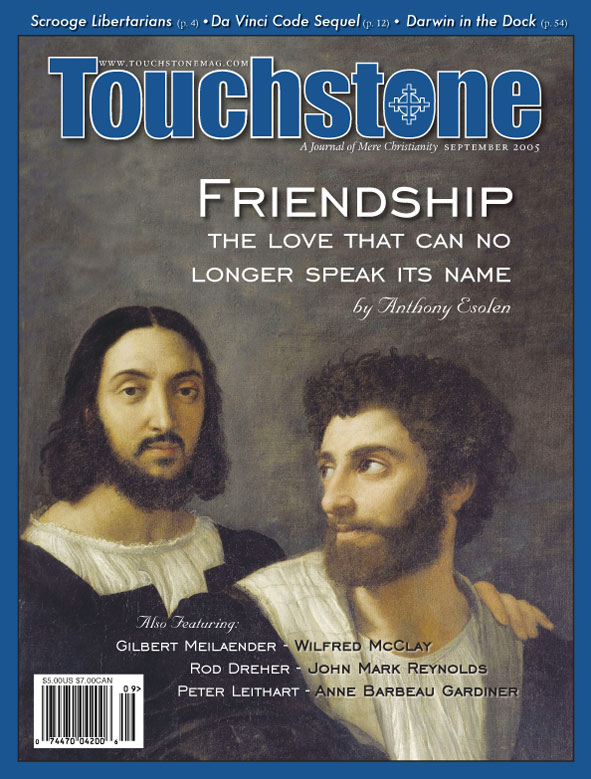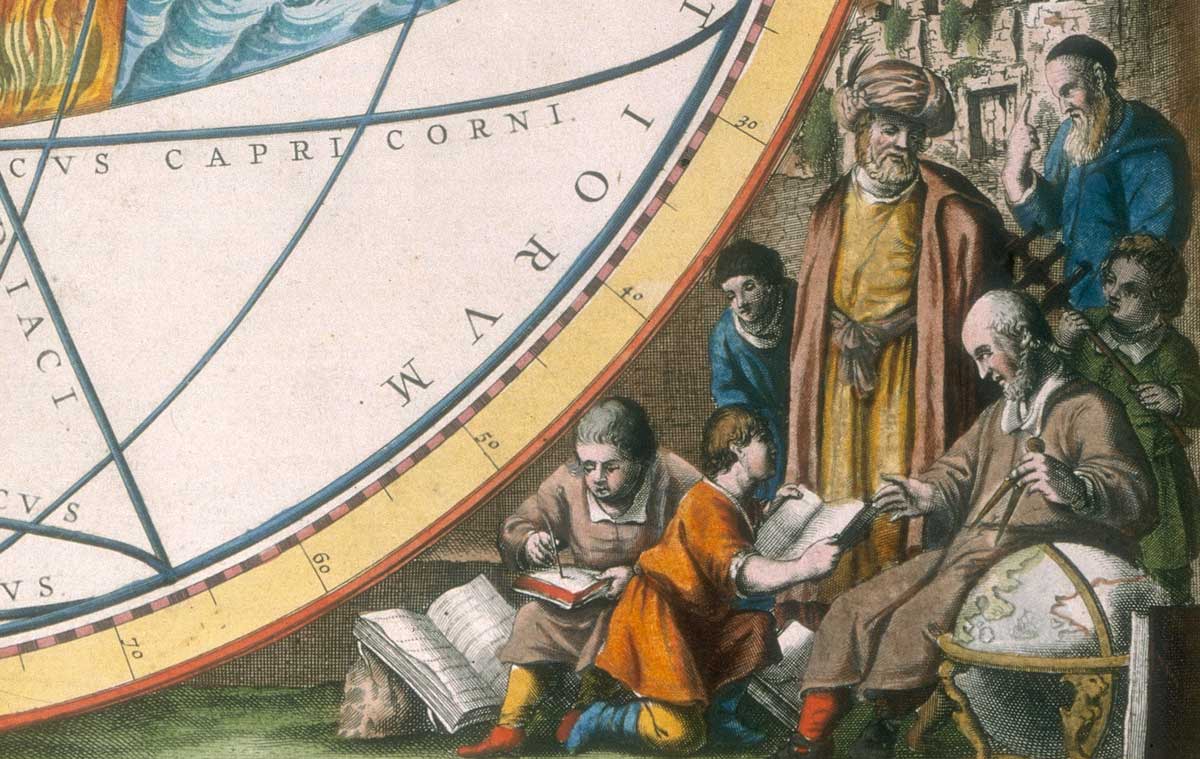Pluralism’s Pride
Peter J. Leithart on Why All Religions Can’t Be Equal
According to one taxonomy, Christians hold three main views of the relationship between Christianity and other world religions. Exclusivists believe that Jesus is quite literally the only way and the only truth. Other religions may make true claims, but they are ultimately idolatrous and their adherents will not be saved.
Inclusivists believe that while all are saved through Christ, conscious faith is not required, and, as D. A. Carson explains, “some may be saved by him who have never heard of him.” Other religions thus may provide some sort of pathway to God, and may even be characterized as “implicitly Christian.” For pluralists, all particular religions are expressions of one experience or truth, and thus represent equally valid means to the same end.
False Modesty
Exclusivists say, “We’re right, and you should agree with us.” Inclusivists say, “We’re right, and you might already agree with us without knowing it.” Pluralists say, “We’re right, but so are you.” I would like to argue that, all other questions aside, there is something to be said for exclusivism simply as a more logical position than pluralism, because pluralism makes its own kind of universalistic claim.
Pluralism is the popular favorite, even among Christians, for its apparent modesty. Exclusivists seem arrogant and oppressive, with their insistence that there is only “one name under heaven whereby we must be saved,” and even inclusivists argue for the superiority and ultimacy of Christian faith, asserting that Christians know the inside story and no one else does.
In contrast, pluralism sounds so humble, so reasonable, so nice: “We all have our traditions. None of us can claim to own the truth. We shouldn’t try to impose our own beliefs on other people. We are all following our different paths to the one Reality of the Ineffable, to the unnameable Something of a thousand names. Why can’t we just get along?”
It sounds humble, but it is arrogant, and absurdly so. Consider an unbeliever who tells a Christian, “I like your Jesus; he was a good man, a great teacher, an example for us all.” What is he saying? First, he is displaying a remarkable ignorance of Jesus, of logic, or of both. As C. S. Lewis argued long ago, a teacher who says, “I am the way, the truth, and the life,” and makes his hearer’s eternal destiny turn on the response to his words, is not a good man or a great teacher. He is claiming to be far more than a good man or a great teacher, and calling him a good man is demeaning in the extreme—like saying that Benedict XVI runs a nice little church.
But the speaker is also asserting—in the nicest possible way—his dominance over his hearer, and over two millennia of Christian history. The pluralist is saying, “I know that behind your claim that Jesus is the Eternal Son of God, the Second Person of the Blessed Trinity, the Last Adam who founded a new humanity, the center of all human history—that behind all this religious rhetoric you are merely saying that you like Jesus. And so do I.”
For an unbeliever to claim that he is saying the same thing about Jesus that a Christian is, or that there is any compatibility between their two claims, is to assert that he knows better than the Christian what Christianity is about. He is foisting his own “take” on Christ onto a Church that has wrestled with the meaning of Jesus, and confessed Jesus to be Lord, for two thousand years.
Not only does pluralism insult Christians (and every other religion and philosophy that makes universal claims), it represents a staggering epistemological claim. The pluralist theologian Rosemary Radford Reuther has stated that there “is no final perspective on salvation available through the identity of only one people,” and in response the Methodist theologian D. Stephen Long asked how anyone could possibly know this to be true. Her claim makes sense, he wrote, “only if the agent herself has access to the universal in a way not open to any faith-community that maintains its historical particularity.”
The pluralist claims to have “knowledge of God that is separate from its historical and material mediations.” In other words, pluralism assumes we can know God whether or not he has revealed himself to us. Against the exclusivist’s claim to know the will of God, pluralism asserts its own exclusive claim to know that God has no such will.
Common Community
While Evangelicals have usually been strongly exclusivist, some are now offering views that do not fit easily into the threefold typology, but seem to offer some of the apparent advantages of pluralism. In his book Renewing the Center, the late Stanley Grenz of Regent College argued from examples like Melchizedek (Genesis 14), Abimelech (Genesis 20), and Jethro (Exodus 18), that “true worship is not limited to those who join the covenant people in paying homage to the God of Israel.”
His argument fails, I think. While it is true, as he argues, that “certain individuals [in the Old Testament] stood in a positive relationship to the one God . . . although they were not directly members of Israel,” this provides no evidence that they stood in the “positive relationship” through their worship of Baal or Zeus. On the contrary, many of the individuals he mentions explicitly confessed Yahweh as God. They were what the New Testament describes as “God-fearers.”
Grenz also urges that “all human religious traditions contribute in some way to the building of society,” and thus have a place in God’s overall purpose of establishing “community in the highest sense.” Yet, “Evangelicals firmly believe that the Christian vision sets forth more completely the nature of community that all human religious traditions seek to foster.”
While Grenz wants to escape the modern notion of a universal genus “religion” of which particular religions are species, he does not do so. He retains a meta-religious category and uses it to measure whether a particular religion is “high” or “low”: namely, the abstract and empty category of “community.”
His argument fails here too, I think. While it may be true that all religions promote “community,” a community that abuses “untouchables” or exposes unwanted infants to die or nurtures suicide bombers is not merely a “lower” but a perverse community. It is not true to say that the Church provides the highest expression of what other religious communities aim at, for religious communities aim at very different things.
Even Grenz’s moderate position betrays a hubris similar to that of the pluralists. He presumes to say to Hamas, “I know that what you really want is community, and the Church provides just what you are looking for.” To which Hamas—which is not a frequent participant in interreligious dialogue—no doubt replies, “We don’t want ‘community.’ We want Islam, submission of all peoples to Allah, and shari’a.”
Staggering Claims
Exclusivism has never been appealing, least of all in the hyper-pluralism of polytheistic Greco-Roman society and in the hyper-pluralism of modern Western society. It has always appeared arrogant, and no doubt always will. It cannot be denied that exclusivism makes staggering universal, and staggeringly universal, claims about God and humanity. But, and this is the point, pluralism makes similarly universal claims, and does so without benefit of divine revelation.
Modern distaste for exclusivism has been aided by the pretense that the main alternative is modest, humble, inclusive. Once that claim is exposed as false, we are in a position to assess the arguments for each position, asking the question that is really at stake in the debate: Which is true?
Peter J. Leithart is an ordained minister in the Presbyterian Church in America and the president of Trinity House Institute for Biblical, Liturgical & Cultural Studies in Birmingham, Alabama. His many books include Defending Constantine (InterVarsity), Between Babel and Beast (Cascade), and, most recently, Gratitude: An Intellectual History (Baylor University Press). His weblog can be found at www.leithart.com. He is a contributing editor of Touchstone.
subscription options
Order
Print/Online Subscription

Get six issues (one year) of Touchstone PLUS full online access including pdf downloads for only $39.95. That's only $3.34 per month!
Order
Online Only
Subscription

Get a one-year full-access subscription to the Touchstone online archives for only $19.95. That's only $1.66 per month!
bulk subscriptions
Order Touchstone subscriptions in bulk and save $10 per sub! Each subscription includes 6 issues of Touchstone plus full online access to touchstonemag.com—including archives, videos, and pdf downloads of recent issues for only $29.95 each! Great for churches or study groups.
Transactions will be processed on a secure server.
more from the online archives

14.6—July/August 2001
The Transformed Relics of the Fall
on the Fulfillment of History in Christ by Patrick Henry Reardon
calling all readers
Please Donate
"There are magazines worth reading but few worth saving . . . Touchstone is just such a magazine."
—Alice von Hildebrand
"Here we do not concede one square millimeter of territory to falsehood, folly, contemporary sentimentality, or fashion. We speak the truth, and let God be our judge. . . . Touchstone is the one committedly Christian conservative journal."
—Anthony Esolen, Touchstone senior editor








